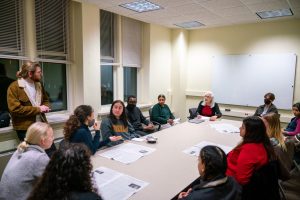MAAS Conference Highlights Importance of Participation
April 5, 2014
Two weeks ago, I attended the 18th Biennial Midwest Asian-American Student Conference, which was hosted by Oberlin’s Asian-American Alliance. MAASC was the first conference I’ve attended that focuses specifically on Asian-American students and issues, so I was grateful for the opportunity to take part in such an event, especially for free. I attended the opening keynote, the “Educate, Organize, Mobilize” workshops and the “Legacy and Activism in APID Student Organizing” panel. My knowledge about Asian-American activism and radicalism is relatively sparse beyond my own identity as an Asian-American and my recent exposure to Asian-American literature. Hearing from those who have been fighting for these issues and learning about the history of the Asian-American movement has been enlightening, and has caused me to identify how my lack of education and participation has affected my life.
One of the speakers at the “Legacy and Activism” panel, Rashné Limki, OC ’05, identified an issue that I’d noticed in my own experiences but hadn’t been able to articulate. She highlighted that at events such as MAASC, it’s important to be conscious of who’s present and absent from conversations about activism and social justice. Last semester, I took a class on African literature, and I had a feeling before the first class that the room would be mostly people of color. I was right. Although it was definitely a nice change to not be one of the few people of color (though I was the only Asian) in the room, the classroom demographic only confirmed my suspicion that white people don’t care as much about these issues and therefore choose not to take classes that address these subjects.
Silence, often an overlooked form of absence, is a device that often renders people and movements worthless of acknowledgement. The lack of participation by white students who make up the majority of the student body at Oberlin is an active choice that deems these issues worthless, or at least not worth their time. This non-participation perpetuates the idea that events about issues affecting people of color are
just for people of color. Social movements focusing on certain groups of people inherently concern all people, especially those that identify outside of the group in question. Concepts of marginalization, dominance, oppression and privilege are mutually constructed and can only be defined in relation to each other. Similarly, people also exist in relation to each other, and although identifiers such as race and ethnicity may be used to form alliances and solidarity, it is impossible to avoid influence from other groups.
I was only able to attend half of the events at MAASC because of homework and other commitments. One of the most difficult things about college for me has been balancing my schedule and making choices about what events I’m going to give my time to. This is a common situation for many college students, and a conference about Asian-American issues probably won’t appeal to already-busy students, especially if they don’t feel like the issues directly affect their lives (viz. white people). Moreover, in my experience, being a college student is very much about exploiting the present moment to its fullest extent in preparation for a successful future; therefore, it’s reasonable that a conference without any immediate, tangible incentives will fail to lure students (viz. everyone ever) during the weekend before midterms. College is a constant series of choices and compromises that students must navigate to maintain some notion of balance in their lives. Time constraints preclude accessibility, leading students to feel overwhelmed rather than enthusiastic about the excess of opportunities.
I think the conference itself was successful — it was exciting to hear from a diverse range of speakers on a multitude of Asian-American issues, many of which I’d been previously unaware of. Several speakers in the last panel discussed the challenges of preserving institutional memory once the students and faculty who are leading campus actions leave. Who will be left to pass down experiences and knowledge necessary for continuing the movements? How do we get people, especially those who don’t identify as Asian-American, to care? The conference left me feeling both hopeless and hopeful, something I’ve learned to accept as inevitable in college and in life.

























